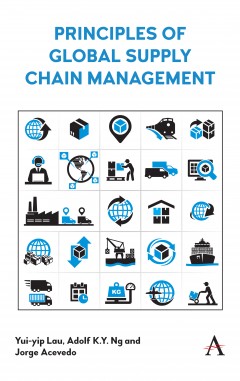Principles of Global Supply Chain Management
By Yui-yip Lau
Adolf K.Y. Ng
Jorge Acevedo
Anthem Studies in Supply Chain Management, Maritime Transport and Logistics
Other Formats Available:
- About This Book
- Reviews
- Author Information
- Series
- Table of Contents
- Links
- Podcasts
About This Book
Many of the textbooks available for undergraduate and sub-degree students beginning to learn the concepts and practice of global supply chains are either too technical or too theoretical in nature. To fill this gap, ‘Managing Global Supply Chains’ includes chapters that cover traditional and contemporary topics (reverse logistics, logistics associations, logistics education, sustainability in supply chain management, operations in global supply chains and financial management). Globalization, advanced technology, organizational consolidation, the empowered consumer and government policy have contributed to the timeliness of the book.
The key topics of each chapter demonstrate a variety of fundamental issues in the supply chain industry: What are supply chain markets? What is the supply chain cost structure? What are supply chain strategies? How do supply chain firms design and implement strategies? What are the key roles of logistics service providers, logistics education operators and logistics associations? How should supply chain operations be managed? How is a sustainable and innovative supply chain structure created? Comparative practical case studies from Asia, North America and Latin America lend weight to the chapters.
Reviews
“Principles of Global Supply Chain Management is an invaluable textbook for those studying the practicalities and future demands on the logistics of globalized production processes. It is also an informative and timely reading for those of us who work on policy making for international trade and its logistics.”
—Jan Hoffmann, Chief, Trade Logistics Branch, UNCTAD, and President Emeritus, International Association of Maritime Economists
Author Information
Yui-yip Lau is a lecturer at the Division of Business and Hospitality Management, Hong Kong Community College, Hong Kong Polytechnic University, Hong Kong. His research interests are supply chain management, higher education, and cruise and ferry. The author of a book, Lau has published more than 130 research papers in international journals and professional magazines, contributed book chapters and presented numerous papers at international conferences. Lau is the chief editor of Seaview and the section editor of Data in Brief.
Adolf K. Y. Ng is professor of supply chain management at the Asper School of Business, University of Manitoba, Canada, and a senior fellow of the university’s St. John’s College. The recipient of prestigious international and national fellowships and academic awards, Ng is the associate editor of Maritime Policy & Management, senior editor of the European Journal of International Management and associate editor of the Asian Journal of Shipping and Logistics.
Jorge Acevedo Alarid, creator of the Holistic Vision Model and the Holistic Infrastructure Model, and president of the Mexican Institute of Logistics (Instituto Mexicano de Logistica), is the founder of the national initiative for the creation of the Federal Customs and Migration Agency (Agencia Federalde Aduanas y Migración) and of Mexico’s Worldwide Logistics Platform project. He is a member of the Mexican Institute of Executives in Foreign Trade (Instituto Mexicano de Ejecutivos en Comercio Exterior) and of the Mexican Association of Intermodal Transportation (Asociación Mexicana del Transporte Intermodal).
Series
Anthem Studies in Supply Chain Management, Maritime Transport and Logistics
Table of Contents
1. Introduction; 2. Managing Outbound Logistics and Distribution; 3. Supplier Selection and Procurement; 4. Warehouse Management; 5. Case Studies in Food Supply Chains; 6. Inland Ports in Global Supply Chains; 7. Climate Change in a Global Environment; 8. Sustainability in Infrastructure-Based Supply Chains; 9. Reverse Logistics; 10. Logistics Associations; 11. Logistics Education; 12. Case Exercises in Global Supply Chains; Index.
Links
Stay Updated
Information
Latest Tweets



